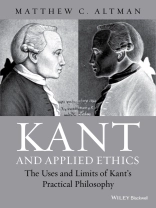Kant and Applied Ethics makes an important contribution to Kant scholarship, illuminating the vital moral parameters of key ethical debates.
* Offers a critical analysis of Kant’s ethics, interrogating the theoretical bases of his theory and evaluating their strengths and weaknesses
* Examines the controversies surrounding the most important ethical discussions taking place today, including abortion, the death penalty, and same-sex marriage
* Joins innovative thinkers in contemporary Kantian scholarship, including Christine Korsgaard, Allen Wood, and Barbara Herman, in taking Kant’s philosophy in new and interesting directions
* Clarifies Kant’s legacy for applied ethics, helping us to understand how these debates have been structured historically and providing us with the philosophical tools to address them
Daftar Isi
Preface vi
Note on Sources and Key to Abbreviations viii
Introduction: Why Kant Now 1
Part I. Applying Kant’s Ethics 11
1. Animal Suffering and Moral Character 13
2. Kant’s Strategic Importance for Environmental Ethics 45
3. Moral and Legal Arguments for Universal Health Care 71
4. The Scope of Patient Autonomy 90
Part II. Kantian Arguments against Kant’s Conclusions 115
5. Subjecting Ourselves to Capital Punishment 117
6. Same-Sex Marriage as a Means to Mutual Respect 139
Part III. Limitations of Kant’s Theory 165
7. Consent, Mail-Order Brides, and the Marriage Contract 167
8. Individual Maxims and Social Justice 194
9. The Decomposition of the Corporate Body 217
10. Becoming a Person 241
Conclusion: Emerging from Kant’s Long Shadow 283
Bibliography 289
Index 311
Tentang Penulis
Matthew C. Altman is an associate professor of philosophy and chair of the Philosophy & Religious Studies Department at Central Washington University. In addition to articles in ethics, applied ethics, and the history of philosophy, he is the author of A Companion to Kant’s ‘Critique of Pure Reason’ (2008), co-author of The Fractured Self in Freud and German Philosophy (2013), and editor of The Palgrave Handbook of German Idealism (2014).












